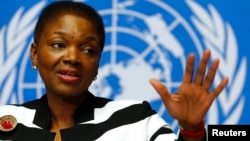GENEVA, SWITZERLAND —
United Nations Emergency Relief Coordinator Valerie Amos is calling for urgent action to prevent further bloodshed in the Central African Republic. Amos says the total breakdown of the state is having grave consequences throughout the region.
U.N. Emergency Relief Coordinator Valerie Amos said during a recent trip to the Central African Republic she was overwhelmed by the level of destruction and climate of fear. She said the state had no institutions that could deliver basic services, and had no capacity to stop the violence.
“There was palpable fear in the eyes of the people that we met in Bangui and also in Bossangoa and lots of people saying that they wanted to leave the country,” she said.
The Central African Republic has a population of 4.6 million people . The United Nations estimates more than half of those people are in need of aid.
Latest estimates put the number of internally displaced at 650,000. Nearly 300,000 others have fled to Cameroon, Chad, the Democratic Republic of Congo, and the Republic of Congo.
Amos warns of a looming food crisis in CAR. She said millions of people would be at risk of communicable diseases with the upcoming rainy season. She said this crisis was likely to be even worse than predicted if the United Nations did not receive a substantial chunk of its $550 million appeal. So far, the U.N. has received only 16 percent.
Amos said the road network in the country was extremely poor. She said money was needed to position food stocks before the rains came and the roads became impassible.
“Then you have IDP sites, like the site at the airport with 70,000 refugees. I talked about the possibility of disease outbreaks. We have not had them so far. With 70,000 people in an IDP site that just gets overrun with rain. The shelter is extremely poor. It will be absolutely terrible and we will see this repeated across the country. And, I have no doubt, that if we do not get these resources and do more, then people will die,” she said.
Amos said the lack of security throughout the country was a huge problem for civilians and for humanitarian workers trying to reach them with essential aid.
Currently, there are 8,000 African Union and French troops on the ground. The Security Council is debating ramping up this force and turning it into a 10,000 strong peacekeeping unit, with an additional 1,820 police.
Amos said such a force would help stabilize the country and keep people safe. However, she noted it would take at least six months to achieve. She said interim measures would have to be taken to ensure protection for the population and humanitarian aid.
U.N. Emergency Relief Coordinator Valerie Amos said during a recent trip to the Central African Republic she was overwhelmed by the level of destruction and climate of fear. She said the state had no institutions that could deliver basic services, and had no capacity to stop the violence.
“There was palpable fear in the eyes of the people that we met in Bangui and also in Bossangoa and lots of people saying that they wanted to leave the country,” she said.
The Central African Republic has a population of 4.6 million people . The United Nations estimates more than half of those people are in need of aid.
Latest estimates put the number of internally displaced at 650,000. Nearly 300,000 others have fled to Cameroon, Chad, the Democratic Republic of Congo, and the Republic of Congo.
Amos warns of a looming food crisis in CAR. She said millions of people would be at risk of communicable diseases with the upcoming rainy season. She said this crisis was likely to be even worse than predicted if the United Nations did not receive a substantial chunk of its $550 million appeal. So far, the U.N. has received only 16 percent.
Amos said the road network in the country was extremely poor. She said money was needed to position food stocks before the rains came and the roads became impassible.
“Then you have IDP sites, like the site at the airport with 70,000 refugees. I talked about the possibility of disease outbreaks. We have not had them so far. With 70,000 people in an IDP site that just gets overrun with rain. The shelter is extremely poor. It will be absolutely terrible and we will see this repeated across the country. And, I have no doubt, that if we do not get these resources and do more, then people will die,” she said.
Amos said the lack of security throughout the country was a huge problem for civilians and for humanitarian workers trying to reach them with essential aid.
Currently, there are 8,000 African Union and French troops on the ground. The Security Council is debating ramping up this force and turning it into a 10,000 strong peacekeeping unit, with an additional 1,820 police.
Amos said such a force would help stabilize the country and keep people safe. However, she noted it would take at least six months to achieve. She said interim measures would have to be taken to ensure protection for the population and humanitarian aid.




